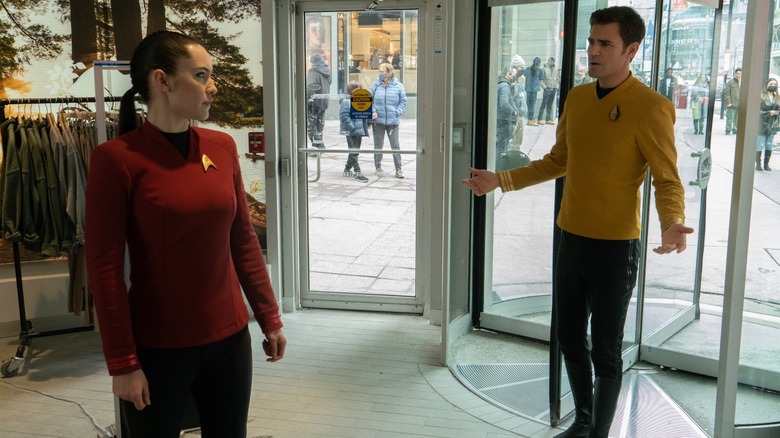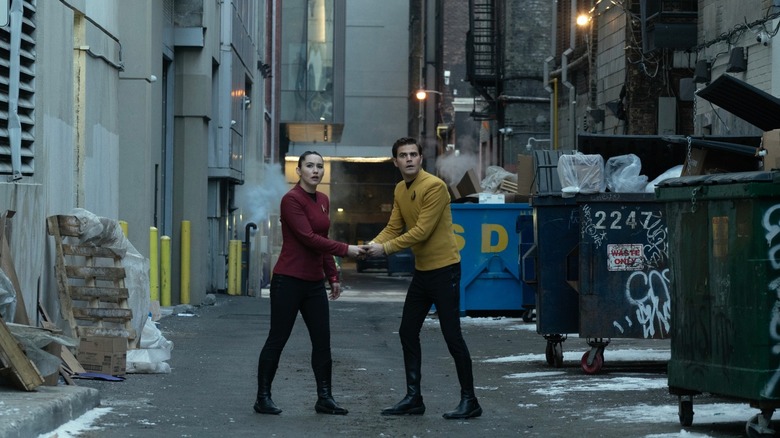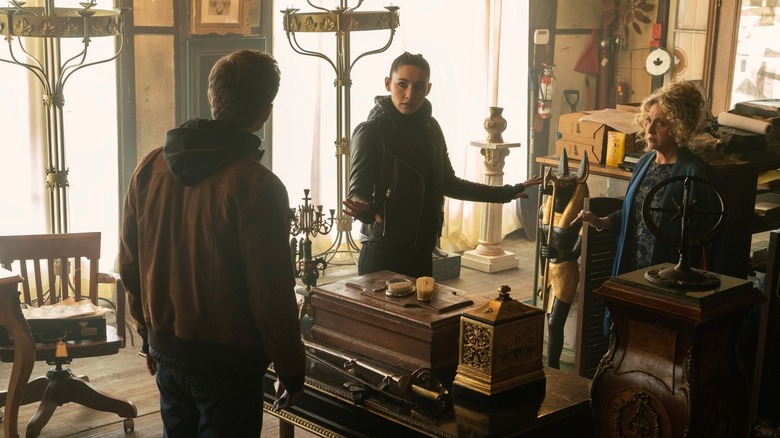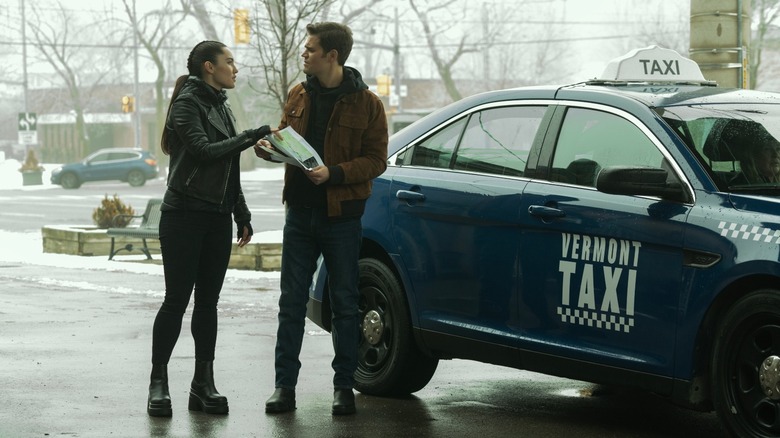Star Trek: Strange New Worlds Season 2 Episode 3 Is About Causality And Poutine
The title of the latest episode of "Star Trek: Strange New Worlds" is "Tomorrow and Tomorrow and Tomorrow," a phrase taken from the same speech in "Macbeth" that gave the original series episode "All Our Yesterdays" its name. Neither episode, however, is about the numbing futility of life as observed by the Bard's usurping Scot. Indeed, both "Tomorrow" and "Yesterdays" are time-travel episodes.
Unlike time-travel stories of more recent vintage, Trek has long been heavily focused on causality. When a character is thrown backward in time — which happens quite often — they immediately slip into disguise, openly concerning themselves with preserving the historical timeline as it is, deeply afraid that they may unwittingly alter history for the worse. While one might understand the need to preserve history as a self-serving measure — you don't want to undo your own existence! — there comes with Trek's stalwart history protection a sense of fatalism. Events happen as they must happen. This was first witnessed in the episode "The City on the Edge of Forever" (April 6, 1967), the episode wherein Joan Collins had to die in a car accident in order to prevent the Nazis from winning World War II. Spock (Leonard Nimoy) assured audiences that it was indeed a butterfly effect at play.
In "Tomorrow and Tomorrow and Tomorrow," La'an Noonien-Singh (Christina Chong) finds herself in 2023 Toronto with Captain Kirk (Paul Wesley), rescued from an alternate timeline. The two have to traverse Earth's past in order to preserve La'an's future. Kirk's future, meanwhile, is disposable; it seems he comes from a time of war and desolation. But don't worry; this Kirk is still breezy, flirty, and fun. As is the whole episode, really.
Low budget Treks
"Star Trek" has benefitted from lower budgets, often working on old CBS sets, going to natural locations, and using pre-fab costumes in their sci-fi stories. To date, "Strange New Worlds" has been very good about abiding by this unwritten mandate, often telling stories that keep the characters on board the Enterprise, or visiting alien worlds that are conveniently within driving distance of Paramount's Hollywood studios. As such, seeing La'an and Kirk snooping through Toronto storefronts, or eating poutine at the Lakeview Restaurant, feels just as much like a cost-cutting measure as a well-worn Trek tradition.
The story is hastily set up: La'an, as security chief on the Enterprise, is very busy. While walking down a corridor, a mysterious man with a bullet wound (!) appears on the ground in front of her. As he dies, he slips a widget into her hand, and she is whisked into an alternate timeline. Kirk is now the ship's captain, the Federation is at war with the Romulans, and the Vulcans are mere allies. La'an is confronted by this alternate Kirk, he grabs her widget, and the two are transported to the 21st century. Despite having come from a timeline wracked by war, Kirk is approachable and genial as he's always been. He explains that in his timeline, Earth is "occupied territory," and that humans now live in underground colonies on the moon, on Mars, and on Europa. He also once spent time in a Denobulan prison. There is little debate as to whose timeline is "correct" between La'an's and Kirk's. Clearly, Kirk figures, hers is better.
Naturally, the two begin to bond and ... fall in love? This is startling for a stern character like La'an, but the two actors' chemistry makes it totally understandable.
More Trek traditions
The pair need clothes, and they pilfer jackets. They comment (amusingly) that if they don't get jackets before nightfall, Toroto's weather could kill them. It also seems that both La'an's and Kirk's timelines wound up in a post-capitalist society, as they have to mutually remind each other that money existed in 2023. In a cliched but effective montage, Kirk shakes down chess players in the park for loonies. Are the fish-out-of-water jokes old-hat for Trek? Yes. We saw them in "Star Trek IV: The Voyage Home." Are they effective, though? Yes indeed. Their journey will eventually lead them to Vermont where La'an will meet a very, very long-lived colleague, Pelia.
Pelia (Carol Kane) may be the Enterprise's chief engineer in La'an's present, but in 2023, she merely runs an antique shop; she hasn't begun her engineering studies yet. "I haven't taken a math class," 2023 Pelia says, "since Pythagoras made the crap up."
The episode's plot involves time-traveling Romulan spies, who need to be stopped before the timeline can be restored. It will also see La'an confronting her ancestors; Trekkies will know that La'an's grandfather was Khan from "Space Seed" and "Star Trek II: The Wrath of Khan." La'an is personally afflicted with her family's dark legacy, hoping to save the name Noonian-Singh from history's sneers. Her moment of ironic fatalism comes when she realizes that Khan, still only a child, may be in danger. It seems that to save her present and correct history, La'an needs her evil grandfather to live. This is a dark choice, given that he would go on to murder thousands and conquer large portions of Earth.
La'an's heart
The time travel shenanigans are fun, of course, even if the story is predictable. Trek tends to revisit certain plots every now and again — "going back in time to prevent a dark alternate future" was used as recently as the second season of "Star Trek: Picard" — so seeing something familiar is no great sin for the franchise. The episode's real strengths, though, come from Chong and her performance as La'an. Previously, the character was depicted as isolated, hard, and serious. She rarely smiled and never joked. With Kirk, La'an lets her guard down, becomes friendly, and begins joking and ribbing her companion in a playful way. We see that La'an has a lot more warmth and personality than her steely profession would have us believe. She is more than her job.
The episode ends with La'an talking to her own timeline's Kirk, knowing that this one would not remember her. She sees a friendly, intelligent person and a good friend. La'an, like Shatner's Kirk at the end of "Edge of Forever," has to live with the ache of fatalism.
"Tomorrow and Tomorrow" also has a cameo from the Department of Temporal Investigations, an organization first introduced on "Star Trek: Deep Space Nine" to address the commonness of time travel in the "Star Trek" universe. It's a cute link to extant canon, and gives La'an someone she can confess to. Moving forward, though, she can't reveal anything to anyone. A clever way to leave such a grandiose adventure off the books.
Storywise, "Tomorrow" is fine. Character-wise, it's first-rate.



